DIGEST: Green Deal & Farm to Fork Strategy
06.02.2020 22:23:40
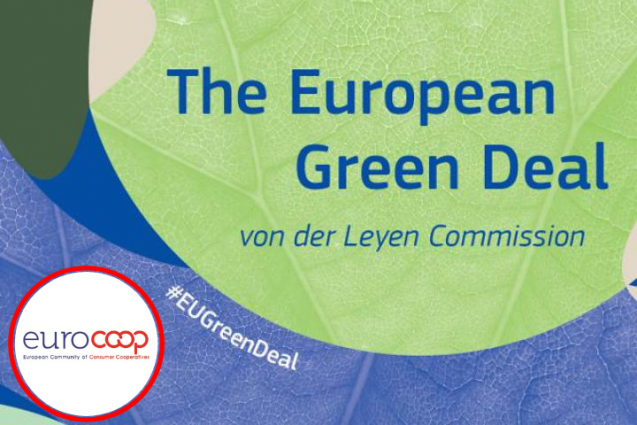
The European Commission continues its strong ambition of delivering on its commitments within the environmental and sustainability agenda. This can be seen in the published Commission Work Plan 2020. Among 43 different initiatives, the European Green Deal and Farm to Fork Strategy are two key dossiers of importance to consumer co-operatives.
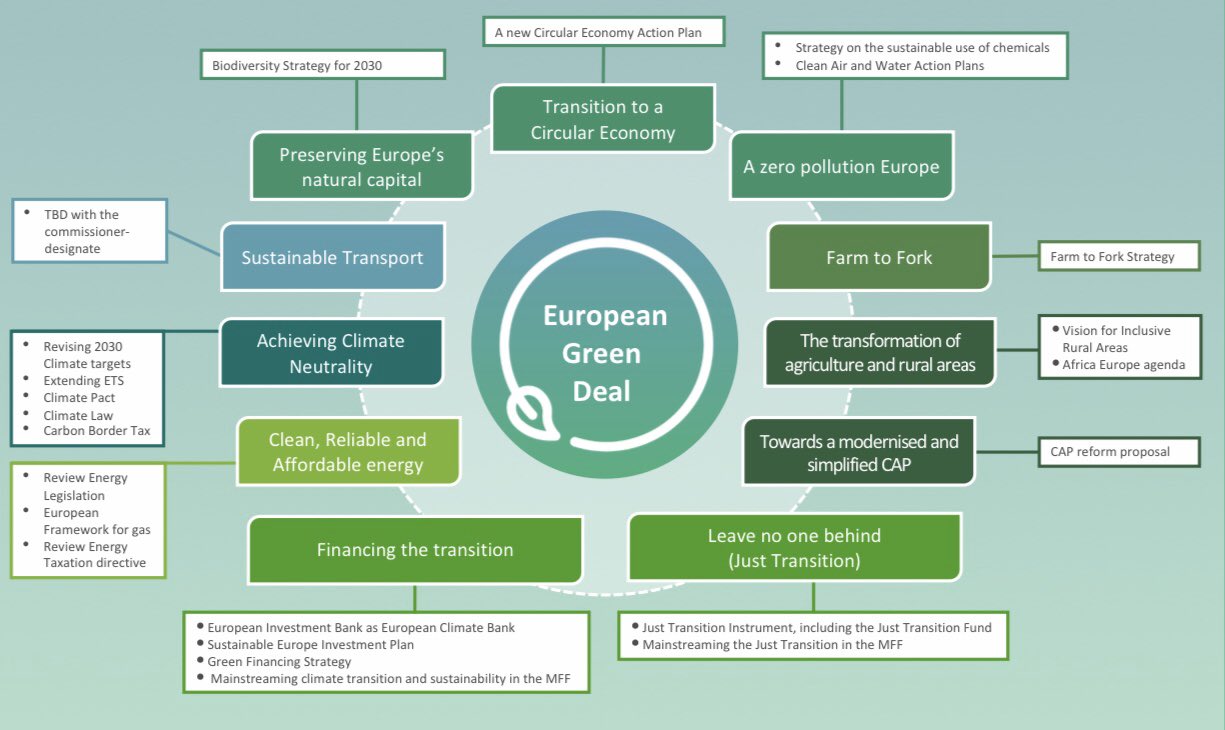
Among the leading policy streams pertaining to the activities of consumer co-operatives are:
- Raising the Bar on Climate Targets
Achieving net-zero emissions by 2050 means increasing the 2030 target for emissions cuts from the current 40% to 50-55% compared to 1990 levels. The EU Commission will present this by March 2020. It is expected to have a huge impact, because the climate targets will shape the economy and introduce multiple regulations to reduce emissions for all stakeholders, including retailers.
- Technological Revolution
The Circular Economy Plan will look to reduce electronic waste and increase the lifespan of devices by encouraging companies to sell reusable, durable and repairable products, perhaps paving the way for consumers to have the “right to repair”. We might even see the end of industry’s strategy of planned obsolescence. The EU Commission will need allies in engaging consumers to change perceptions, lifestyles and gather their preferences and study their behaviour. Consumer co-operatives are best placed as trusted stakeholders in reaching the final consumers.
- Did Anyone Say Chemicals?
What is expected by 2021 is a strategy for sustainable chemicals, including efforts to limit endocrine disrupters (EDC), very persistent chemicals such as PFAS and harmful combination effects. Hopefully, the underlying principle would be to simplify the wide array of existing chemicals legislation. Euro Coop members are very vocal on the issue, calling for EDC to be banned, tougher testing procedures and enforcement, and for simplification of the existing rules, too. An opportunity for consumer co-operative to be seen as pro-active operators protecting humans and the environment and going beyond current legislation.
- Funding
The Green Deal introduces a European Green Deal Investment Plan (EGDIP) and a Just Transition Fund. The former, also known as the Sustainable Europe Investment Plan (SEIP), is the investment pillar of the Green Deal. In order to realize the EU Green Deal’s concrete goals, the Investment Plan will look to mobilise €1 trillion in sustainable investments by 2030. As part of this is the Just Transition Mechanism aimed at ensuring a fair and just green transition with a fund which will mobilise at least €100 billion in investments over the period 2021-2027 to support workers and citizens of the regions most impacted by the transition.
The EU Green Deal Investment Plan has three main objectives:
increase funding for the transition, mobilising a minimum of €1 trillion in support of sustainable investments over the next decade through the EU budget and associated instruments;
create an enabling framework for private and public sustainable investments;
provide support to public administrations and project promoters in identifying, structuring and executing sustainable projects.
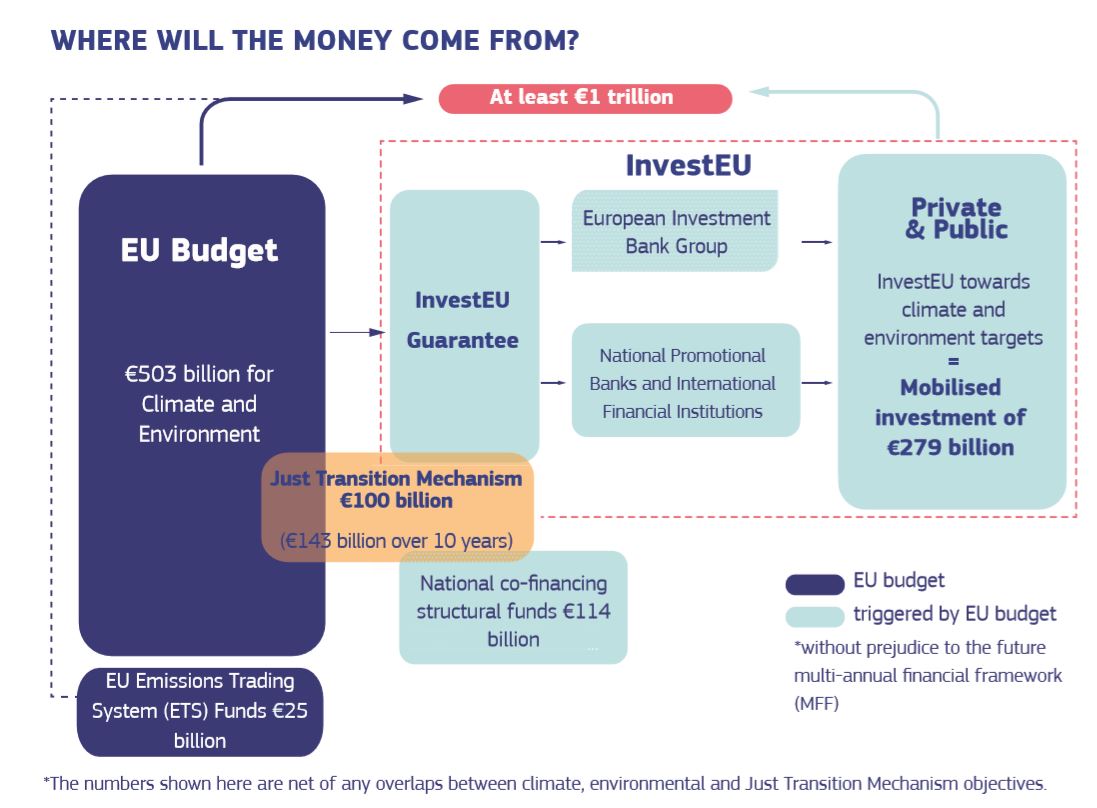
Here is a breakdown of the funding sources for the target of raising € 1 trillion:
€503 billion = EU Budget (2021-2027)
€114 billion = Additional national co-funding
€279 billion = InvestEU mechanism (public – private investment)
€100-143 billion = Just Transition Mechanism
The EU budget (2021-2027) alone cannot provide the full funding, therefore, Member States and private actors will need to share the commitment. The Commission proposed 25% of its total to contribute to objectives related to the climate and environment. This means that the EU budget will provide €503 billion, and it will trigger additional national co-financing of an estimated €114 billion for the 7-year period. These climate and environment projects will raise a combined €617 billion of the €1 trillion.
For the remaining part (€ 373 billion), the InvestEU mechanism will facilitate private and public investments in leveraging around €279 billion by 2030 (three years past 2021-2027 budget). It will provide an EU budget guarantee to allow the EIB Group and other implementing partners to invest in higher-risk projects, crowding in private investors.
To ensure no one is left behind, the Just Transition Mechanism will mobilise at least €100 billion of investments over 2021-2027 with financing coming from the EU budget, co-financing from Member States as well as contributions from InvestEU and the European Investment Bank (EIB). Extrapolated over ten years, the Just Transition Mechanism will mobilise around €143 billion.
Further information here.
Farm to Fork Strategy
The highly ambitious Farm to Fork Strategy (F2F) is the flagship initiative in delivering on the Von Der Leyen promise for Sustainable Food Systems. The EU Commission will present the Strategy in March 2020 and launch a broad stakeholder debate covering all the stages of the food chain with the aim of formulating a more sustainable food policy. For long, Euro Coop’s position has called for this precisely – a sustainable food system combining economic viability with social and environmental responsibility.
The EU Commission’s Communication on the Green Deal includes a section devoted to the F2F Strategy which references certain policy directions that are briefly presented below, together with the relevance to consumer co-operatives.
- Sustainable Agricultural Techniques
Promoting the use of sustainable practices, such as precision agriculture, organic farming, agro-ecology, agro-forestry and stricter animal welfare standards.
Consumer co-operatives have a long tradition of supporting farmers in these operations, and above all, promoting high animal welfare standards. It is an opportunity to share the successful practices with the EU Institutions and raise the visibility of our members as drivers of sustainability.
- Circular Economy: Lowering the Environmental Footprint
The aim is to reduce the environmental impact of the food processing and retail sectors by taking action on transport, storage, packaging and food waste. This will include actions to combat food fraud, including strengthening enforcement and investigative capacity at EU level.
Consumer co-operatives are at the forefront of packaging reformulation and labelling with the aim of maximum and user-friendly consumer information. Reducing food waste has been and continues to be the focus of Euro Coop members’ campaigns designed to raise awareness among consumers of the need to change consumption patterns. Euro Coop is already participating in the EU Commission’s consultative platforms tasked with establishing criteria to define and measure food waste. Within the consultation phase, Euro Coop must put forth the position of consumer co-operatives by presenting their innovation, but also to avoid any future legislative requirements which would overburden retailers concerning the packaging and/or requirements to reduce food waste, which run contrary to viable business practices.
- Sustainable Consumption & Healthy Lifestyles
Lastly, the Farm to Fork Strategy will strive to stimulate sustainable food consumption and promote affordable healthy food for all. Imported food must comply with EU’s high environmental and food standards. The EU Commission wishes to propose actions to help consumers choose healthy and sustainable diets and explore new ways to give consumers better information, including digitally, on the origin of food, its nutritional value, and its environmental footprint. This would also include product labelling schemes.
Euro Coop must make clear the vast array of successful practices across our members in promoting healthier lifestyles, providing consumer information through multiple channels, including digitally, and campaigning for environmentally conscious food choices. Most of these actions are included in our EU Manifesto’s policy recommendations under the food and sustainability sections.
- Supporting Farmers
The Farm to Fork strategy will also contain proposals to improve the position of farmers in the value chain.
This could trigger legislation actions targeting the further restriction of retailers’ operations, as was the case with the UTP Directive. Therefore, Euro Coop and other retail organisations have a responsibility to ensure a balanced and fair supply chain, especially concerning consumer co-operatives.
The non-legislative overview of the F2F Strategy is expected by the end of March 2020. The Secretariat will report on any respective advancement in due course.
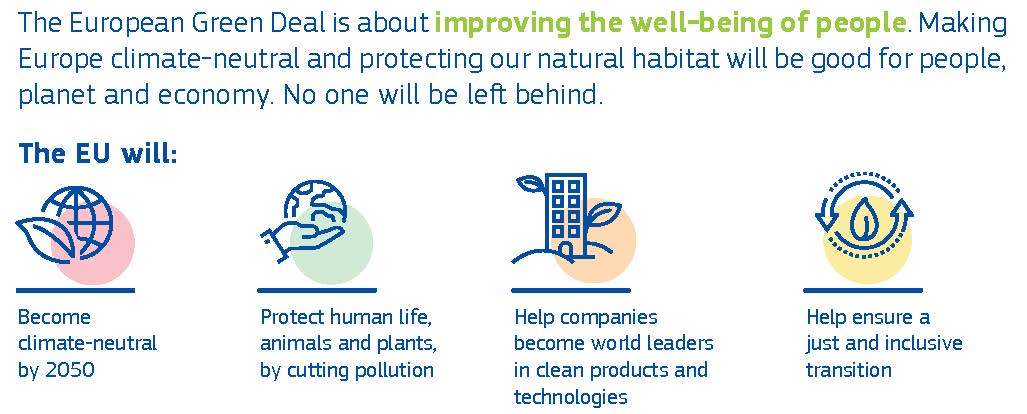
Latest Sustainability Policy news
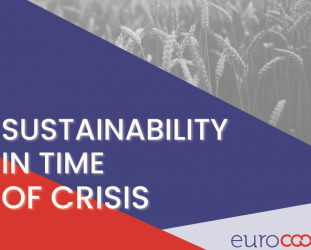
Sustainability in Time of Crisis
Since its inception, the new Commission led by President Ursula von der Leyen committed to set...
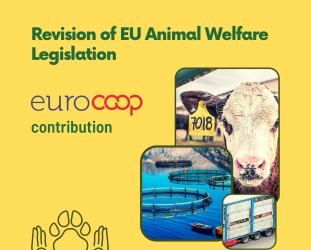
Euro Coop contribution on the Revision of EU animal welfare legislation
After adopting the Farm to Fork strategy in 2020, the European Commission launched a...
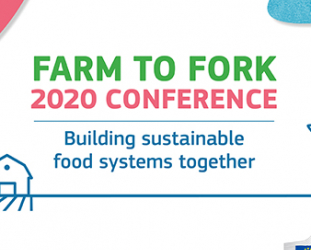
Farm to Fork 2020 Conference: Building Sustainable Food Systems Together
On 15 and 16 October, the EU Commission honoured World Food Day 2020 by holding the 'Farm...
Latest Sustainability Policy stories
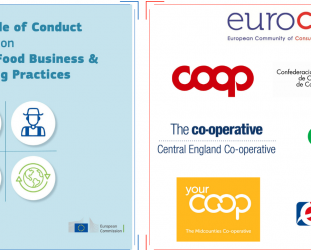
Press Release: EU Code of Conduct
Today, the European Commission unveiled the long-awaited EU Code of Conduct on Responsible...
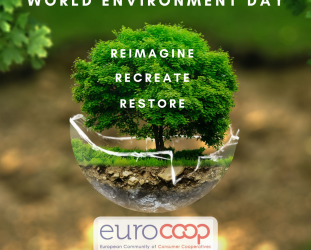
World Environment Day 2021
This year’s World Environment Day marks a perfect opportunity to...

Workshop: Sustainable Consumption & Circular Economy
Watch the session’s recording here . Euro Coop organised a 90-minute...

